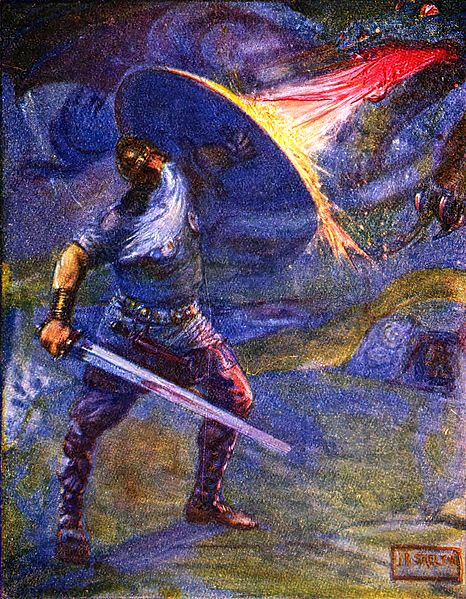 |
| Beowulf faces the dragon (Wikipedia) |
Note: How does a young hero top his own celebrity? By becoming an old hero! Let's see how Beowulf seals his reputation, and suffers death for his troubles.
Get Ready: Is there such a thing as "peaking" too early? Or is it better to have one's success when young, and ride through life on one's reputation?
Let's continue with the first great epic written in what is now the English language.
After the fights in which Beowulf killed the monster Grendel and his mother (see Lesson #08-252), he returned home to his people as a hero. In time he became King of the Geats and governed the land for fifty years.
Then more trouble came.
A runaway slave had hidden in a cave in which a dragon had been guarding his hoard for over 300 winters. Hoping to buy his way back into his master's service, the slave took a huge golden cup, but all he accomplished was to awaken the dragon's wrath.
The serpent went on a rampage, burning the people's homes--and Beowulf's, too. The virtuous old King saw it as his duty to rid his country of this plague and to do so single-handedly, as he had done with Grendel and his mother. So as he approached the dragon's lair, he told his men to wait behind him, and he called the dragon out alone.
Unlike back in Denmark, Beowulf was armed a sword and shield. But when the flames shot out of the beast's mouth, the shield did nothing to stop them, and the hero suffered excruciating burns.
One of his men, Wiglaf, decided to help Beowulf (after haranguing the others for their cowardice). As he rushed in, the dragon's flames burned his wooden shield to ashes. Wiglaf hid under Beowulf's shield and made his attack.
Beowulf, meanwhile, struck the beast's head, but he was so strong that his sword shattered. The dragon rushed upon him, and seized him by the neck with its poisonous fangs. Wiglaf, though scorched, took this opportunity to smite the dragon lower down on its neck, and the fire began to abate. The King then drew his war-knife and ended the monster's life. Working together, the two had destroyed the dragon--but the dragon had also destroyed Beowulf.
As Beowulf lay dying of the poison inflicted by the dragon's bite, Wiglaf brought him water, and the king lamented that he had no son to whom he could leave his armor. He asked Wiglaf to pile up some of the dragon's hoard where he could see it, and expressed his pleasure about leaving so much to his people.
He then gave Wiglaf instructions for his burial: he was to build a barrow out on a headland overlooking the sea. He bestowed his armor on Wiglaf--a great honor--and named him as his successor, since Wiglaf, a distant cousin, was his last surviving relative.
At last, declaring that he now must join all of his departed relatives, the old King died.
--------- Read more: https://en.wikipedia.org/wiki/Beowulf
- Read a prose version of Beowulf FREE online
Practice: Match the term to its definition below:
- abate
- barrow
- excruciating
- haranguing
- headland
- hoard
- lamented
- scorched
- single-handedly
- smite
- a burial mound
- a gathering of treasure
- burned badly
- by oneself
- extremely painful
- strike; hit
- a point of land looking down on the sea
- reduce; become less
- lecturing or scolding aggressively
- expressed sorrow
Answers are in the first comment below.
Submitted to the Shenzhen Daily for November 10, 2022


Answers to the Practice: 1. h; 2. a; 3. e; 4. i; 5. g; 6. b; 7. j; 8. c; 9. d; 10. f
ReplyDelete